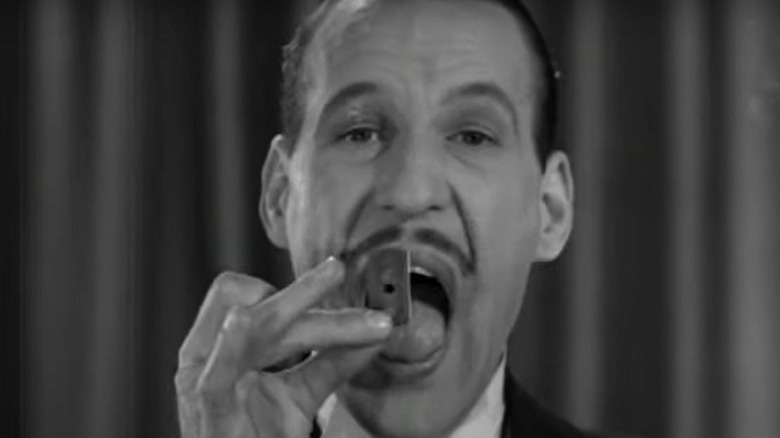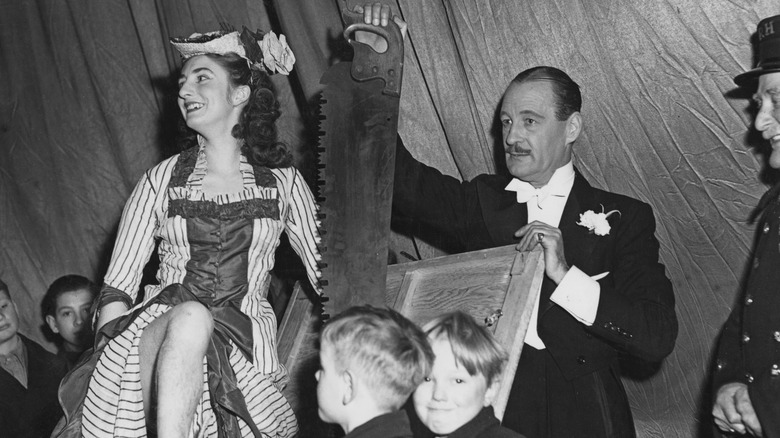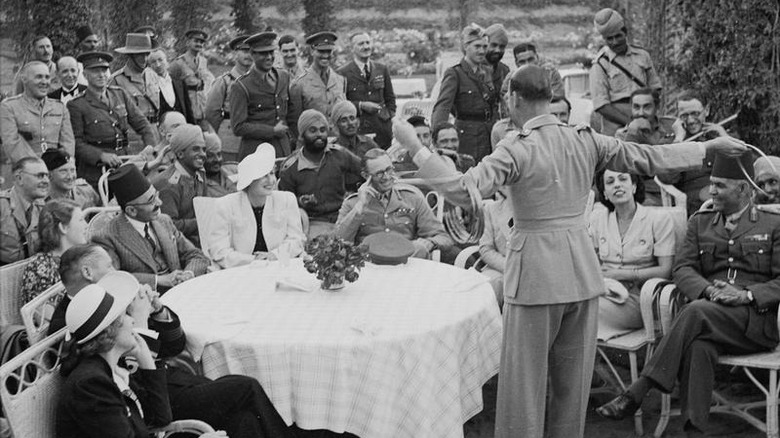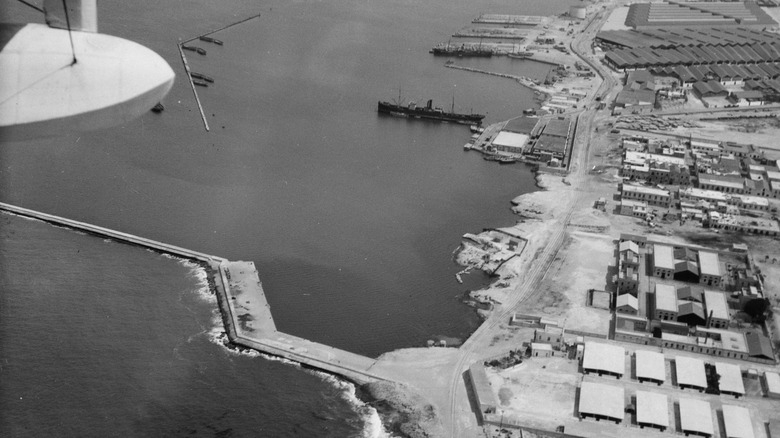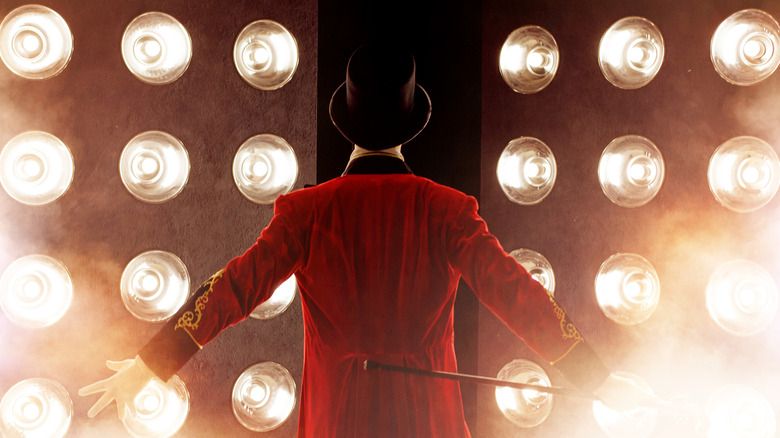Jasper Maskelyne, The World War II Magician Who Made Tanks Disappear
The year is 1937. Color has yet to exist in TV shows and movies. Plus, everyone speaks in that weird, old-timey Transatlantic accent. A magician in this black-and-white world gets on stage and talks in that accent. He's pencil-thin, has an equally pencil-thin mustache, and wears a tuxedo. He starts with a joke that uses the classic opener, "I went to my doctor the other day." "I can't eat properly," he continues, "I wonder, could you give me a good tonic to put an edge on my appetite?" The doctor replies, "If I were you, I'd eat a lot of razor blades every day." Har har har. But then this magician picks up a razor blade, places it on his tongue, closes his mouth, and swallows. And would you guess? He doesn't shred his esophagus and die in agony.
That little vignette, while it could easily pass for marginally decent (if derivative) period fiction, is not a product of imagination. You can watch magician Jasper Maskelyne do this exact trick on British Pathé on YouTube. He then chews up a piece of string, seems to swallow it, and pulls out the string connected to one, two, three, four, five, etc., razor blades. Maskelyne didn't just make razor blades disappear, though. He apparently made tanks, buildings, and even an entire city disappear. He overreached a bit, but also performed illusions — and crafted gizmos and camouflage — in service of World War II Allies.
A member of magical royalty
So you're thinking "Jasper Maskelyne" couldn't possibly be a real name, right? Well, believe it or not, Jasper Maskelyne appears to be his real birth name. It must be true that some names define destiny.
Speaking of destiny, Maskelyne came from a family of magicians. Born in 1902, Jasper's father was Nevil Maskelyne, a magician and inventor who created a line of typewriters and the first pay toilets. Jasper's grandfather was John Nevil Maskelyne, also a magician. From his father Jasper inherited his knack for crafting mechanical doodabs and doohickeys, and from his grandfather he inherited the first letter of his first name, "J." But most critically, from his entire family Jasper inherited money. He followed in his family's footsteps and performed his first magic act at the age of 9.
Maskelyne took over the family business at England's Home of Magic at St. George's Hall in London's West End in the late 1920s. He was quirky, funny, had a good stage presence, and made a name for himself as a world-class magician. In particular, his razor blade-swallowing act was a big draw. He was not, however, very good with finances. This is why he wound up in the British Royal Engineers in 1939 following the outbreak of World War II.
A real-life war mage
Jasper Maskelyne managed the family theater so badly that he basically drove it into the ground. After selling the theater he turned to wielding his family name to sell suits. There's no telling if the suits contained hidden trap doors in the back.
Maskelyne tried to go straight for the top of the military and become an officer, but the British Army said no. That's when he turned to the Royal Engineers. It's unclear exactly what kind of plot Jasper was hatching at that point, but he definitely wanted to go above and beyond the role of a rank-and-file serviceman. Jasper pitched his entry into the service — a hard sell because of his age, 37 — by saying he could use magic to help win the war. It isn't hard to imagine that army personnel thought he was weird and a bit ridiculous, but eventually they admitted him to the army's camouflage unit. In a letter quoted on Internet Archive, Jasper said that World War II meant "focusing my whole life on the problem of how best to mobilize the world of magic against Hitler." Jasper might not have been talking Gandalf-level wizardry, but he certainly sold himself as history's first war mage.
Driven to prove his usefulness, Jasper decided to try and impress a visiting inspector general. The general bumped into a disguised machine gun, admired Jasper's camouflage techniques, and promptly shipped Jasper to the North African front.
No mere conjurer of cheap tricks
By all accounts Jasper Maskelyne found his perfect military home under General Officer Commanding-in-Chief of Middle East Command Archibald Wavell. Wavell was in charge of a massive swath of territory from Egypt through eastern Africa, out to Iraq and Syria, and even up into Greece. He'd also — helpfully for Jasper — formed an Intelligence for Deception division. Jasper, as the supposed master of camouflage, worked with an officer named Dudley Clarke, the master of deception.
If this wasn't absurd enough, Jasper wielded his apparently god-level powers of charm and charisma to get his own army unit, the Camouflage Experimental Section. He interviewed over 400 candidates to compose a crack squad of misfits and rule-breakers that he dubbed the "Magic Gang." In a feat of typical Jasper self-promotion — and more than a massive bit of characteristic over-promising — he once boasted to Winston Churchill's science advisor (via Warfare History Network), "Given a free hand, there are no limits to the effects I can produce on the battlefield."
Nonetheless, Jasper seems to have pulled through on more than one occasion. Using espionage more than mechanical engineering and optical illusions, Jasper performed magic shows for the army that allowed undercover operatives to be secreted in and out of various locations. He also invented a "sunshield" with nothing more complicated than wooden beams and a canopy of painted fabric to make it difficult for enemy airplanes to spot tanks in the desert.
Jasper's biggest illusion yet
Shielding tanks from enemy sight is one thing, as well as giving what Warfare History Network calls "escape and evasion lectures," but making a whole city disappear? David Copperfield, eat your heart out.
Jasper and the Magic Gang — which totally needs to be a '70s retro rock band name — finally got their big chance to prove themselves when the German air force wouldn't stop bombarding Alexandria Harbor in Egypt. Jasper and his coterie of proteges scoped out the harbor and drafted a plan of defense that, if it had failed, would have gone down as the dumbest, most ludicrous idea in the history of ever. Build an entire mock harbor out of cardboard to draw away the enemy? Combine some explosive discharges with tricks of lighting and optics to distort pilot perspective when viewed from above? Lure German fighter jets away from Alexandria Harbor and toward a new location — Maryut Bay — only a couple miles away? Turn off all the lights in Alexandria Harbor to shield it from sight at night?
Believe it or not, the illusion apparently worked ... at least according to Jasper. One night, two nights, three — the German Luftwaffe went for the fake target. In his 1949 book "Magic — Top Secret," Jasper expounds on his feats by claiming to have also developed "dummy men, dummy steel helmets, dummy guns by the ten thousand, dummy tanks, dummy shell flashes by the million, dummy aircraft," and more.
A dazzling, self-made legend
There's one problem with all these stories of Jasper Maskelyne: many of them come from Jasper himself. Jasper's book "Magic — Top Secret," plus 1983's biographical "The War Magician," are two of the only sources we've got for his escapades. We know for sure that Jasper embellished some inventions and feats, like his Dazzle Lights, "a rotating structure of light constructed of mirrors and 24 powerful anti-aircraft searchlights," as Wargaming.net says. Many of his other actions remain unsubstantiated, but real after a fashion. All That's Interesting says that the sunshields existed but were a "bulky failure" and had to be redesigned using steel. It also claims that Maskelyne's Magic Gang never existed. Other sites like MagicTricks.com speak of Jasper in glowing, reverent tones. Magician Roger Lapin, contrarily, adopts a middle-ground approach. He also tells us that Jasper moved to Kenya in 1948, where he gave driving and magic lessons until he died in 1973.
No matter how we regard Jasper — huckster or hero — he did serve in the British military during World War II, performed magic acts for troops, and tried his hand at implementing imaginative, magic-inspired ways of conducting warfare. And if you're wondering why none of this has been into a movie yet, have no fear: Benedict Cumberbatch will be playing a perfectly cast Jasper in "War Magician," announced 2021. It seems that in the end, Jasper has at least proven exactly how far bravado can take a legacy.
